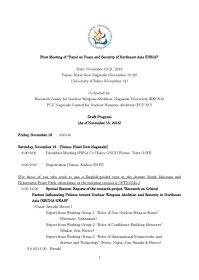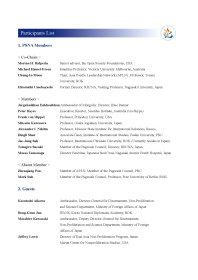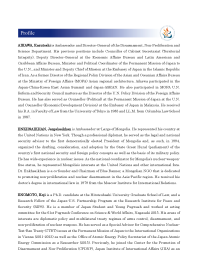November 20, 2016 | Nagasaki, Japan
A possible breakthrough in prohibiting nuclear weapons
On October 27, 2016, we witnessed the historic resolution (L.41) adopted by the First Committee of the 71st Session of the UN General Assembly, which “decides to convene in 2017 a UN conference to negotiate a legally-binding instrument to prohibit nuclear weapons, leading towards their elimination.” We welcome the fact that 123 countries (non-nuclear weapon state members of the Non-Proliferation Treaty (NPT) plus the DPRK) supported this historic resolution. On the other hand, it is truly regrettable that not only four nuclear weapon states (US, Russia, UK and France) but other most of the non-nuclear weapon states (except Netherlands which abstained) that fall under extended nuclear deterrence, such as NATO countries, South Korea and Japan, opposed this resolution (38 countries opposed and 16 abstained). We urge them to support the resolution and to join negotiation of a treaty to prohibit nuclear weapons.
Northeast Asia: Stalemate and Possible Hint for Negotiations
In the Northeast Asia region, defining and consolidating Mongolia’s nuclear-weapon-free status presents an example of successfully addressing a nuclear security issue by political and diplomatic means, bearing duly in mind the interests of the parties involved and setting a positive example.
Despite this example, there continues to be the stalemate, or even a regression, in the efforts for denuclearization of Northeast Asia. After three years of absence, the fourth and the fifth underground nuclear tests were conducted by the DPRK in 2016, and many tests were also conducted in relation to ballistic missiles that can be used as vehicles for such weapons. Those tests are clearly a violation of UN Security Council’s resolutions and we express our deep concern about the progress made by the DPRK nuclear weapon programs.
We also witnessed military reactions from both sides to show force, including regular reinforced US-ROK joint military exercises, flight operations by the US strategic bombers from the continental U.S. and Guam, and Korean People’s Army landing and anti-landing drills. The agreement between the U.S. and the ROK to deploy THAAD system on the soil of the ROK has raised tension in the area beyond the Peninsula.
The remarkable situation in NEA is also characterized by the fact that no official forum involving the DPRK, either bilateral, trilateral or multilateral, to overcome such stalemate or regression in nuclear issues has taken place since the 2012 leap day agreement between the DPRK and the US. It is clear that the so-called “strategic patience” policy by the US is not working, and so far no major initiatives have been taken by members of six party talks to break this stalemate.
On the other hand, we note that there were significant calls for a negotiation from the DPRK to the US. In January 2015, the DPRK proposed that, in exchange of the US temporary suspension of joint military exercises in ROK and its vicinity, the DPRK will be ready to take such responsive steps as temporarily suspending its nuclear test. This call was repeated in January this year, by saying all proposals were still valid “including the ones for ceasing our nuclear test and the conclusion of a peace treaty in return for U.S. halt to joint military exercises.”
Moreover, the DPRK presented five concrete points of conditions on July 6, 2016 . The US administration agreed four out of five points previously. The DPRK also said that, if such conditions were met, a decisive breakthrough would be made in realizing the denuclearization on the Korean peninsula. In our view, those conditions were worth considering. Inaction in engaging the DPRK in regional talks to develop a scheme for shared peace and security in the region will only give more time that will serve for the DPRK to strengthen its nuclear capabilities.
Need for a Comprehensive Approach
Now it is clear that engagement of the DPRK cannot be limited to just nuclear and missile issues, but should extend to a more comprehensive agenda including a peace treaty to end the Korean War and establishment of a Nuclear Weapon Free Zone in Northeast Asia (NEA-NWFZ) which will provide security assurances to a non-nuclear DPRK, the ROK and Japan. We recommend establishment of a platform for discussions involving various Northeast Asian security issues. Lack of such a forum is one of the weaknesses of the existing security framework in Northeast Asia. We call on all the member countries of the six party talks to renew their efforts to break the current negative situation in NEA and to convene a new round of talks.
We are concerned about Nuclear Weapon States’ nuclear modernization programs and other activities, such as ballistic missile defense deployment, that escalate the arms race in the region, and call upon them to restrain these activities.
Especially, we urge new President-elect Donald Trump to become more aware of the real threats posed by nuclear weapons regionally and globally, and to carefully consider new nuclear weapon policy options through dialogues at both official and civil society levels instead of pursuing purely military solutions. If such careful consideration is given, the change of US Administrations could be an opportunity to gain new momentum for a possible diplomatic breakthrough.
Also we call for special roles to be played by the ROK and Japan. In recent discussions that led to the above UNGA resolution to legally prohibit nuclear weapons, such roles to be played by non-nuclear countries that are dependent on extended nuclear deterrence have been emphasized. The ROK and Japan should not demand strengthening extended nuclear deterrence from the US but rather should demonstrate that regional nuclear threats can best be solved by diplomatic processes such as a comprehensive approach to establish a NEA-NWFZ. This will also contribute to decreasing the role of nuclear weapons and moving towards global nuclear disarmament. Additionally, Japan’s plan to separate more plutonium on top of existing huge stockpile undermines the opposition to unnecessary and dangerous plutonium separation in China and S. Korea.
1 Korea Central News Agency, July 6, 2016. Five points are; 1) all nuclear weapons of the US in South Korea must be publicly disclosed; 2) all nuclear weapons in the South Korea should be dismantled and verified; 3) Washington must guarantee that it will not deploy offensive nuclear weapons in South Korea and its vicinity; 4) the US must commit not to use nuclear weapons against North Korea; and 5) Washington declare its willingness to withdraw from South Korea all troops holding the authority to use nuclear weapons.
Morton H. Halperin
Senior advisor, the Open Society Foundations
Michael Hamel-Green
Emeritus Professor, Victoria University Melbourne
Chung-In Moon
Chair, Asia Pacific Leadership Network (APLN)
Professor, Yonsei University
Hiromichi Umebayashi
Former Director, RECNA; Visiting Professor, Nagasaki University,



















